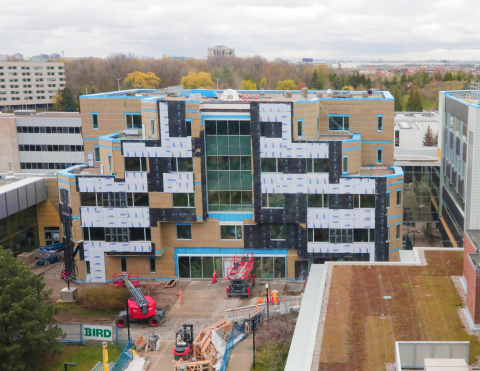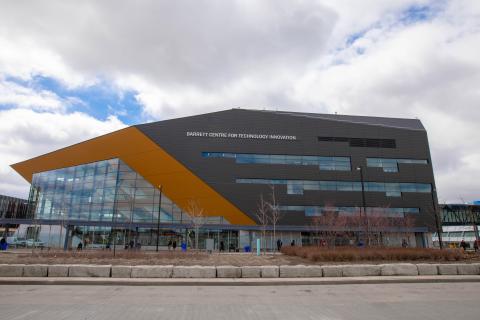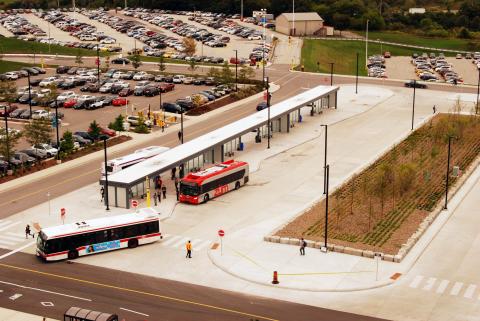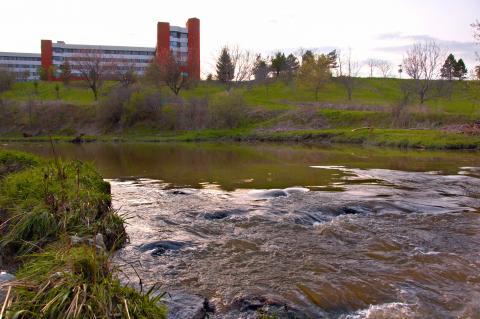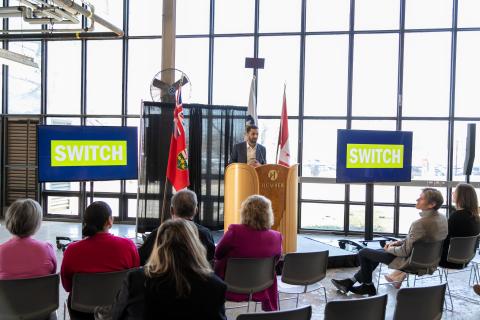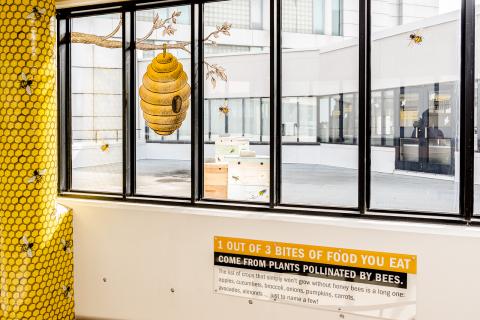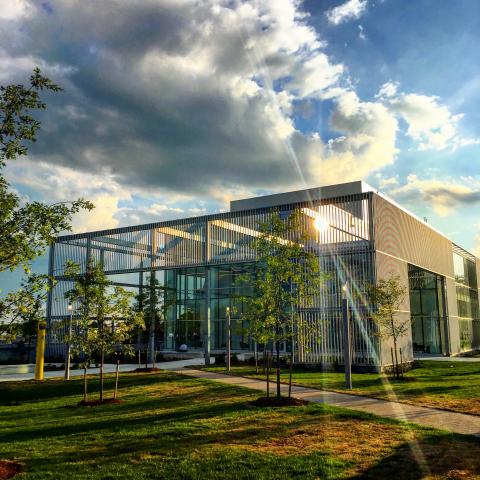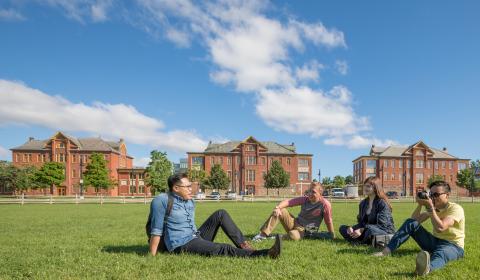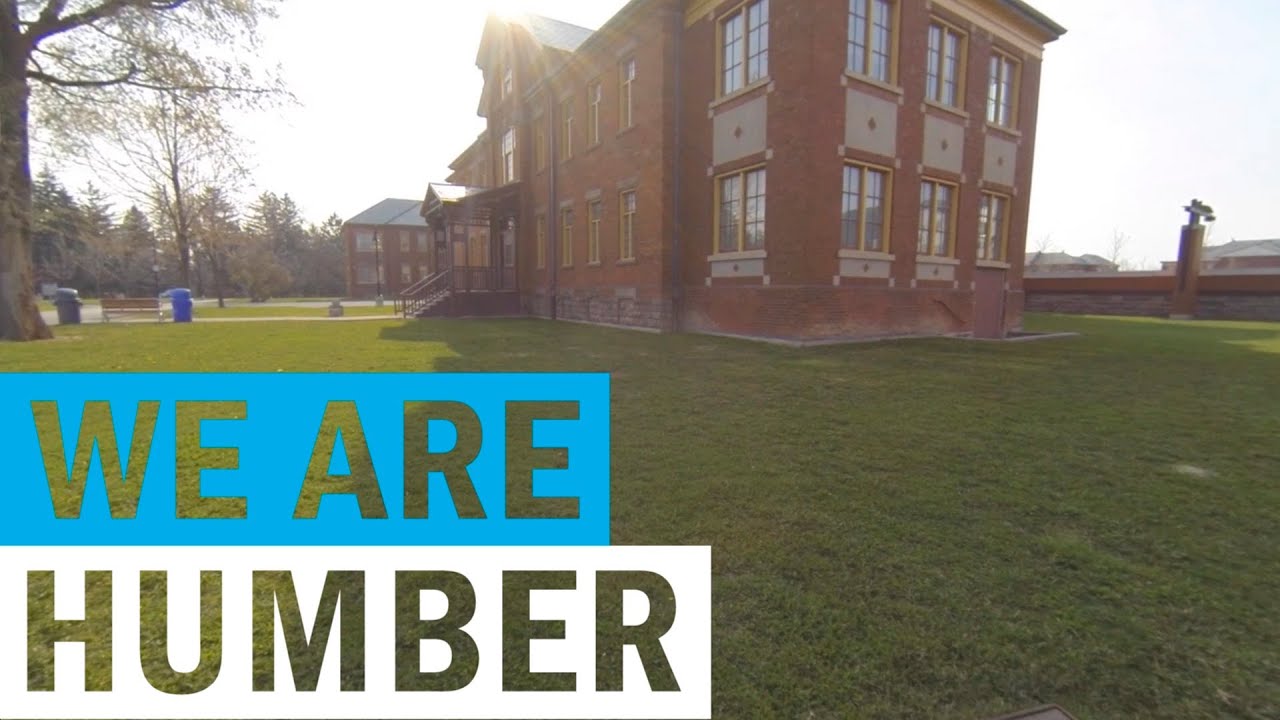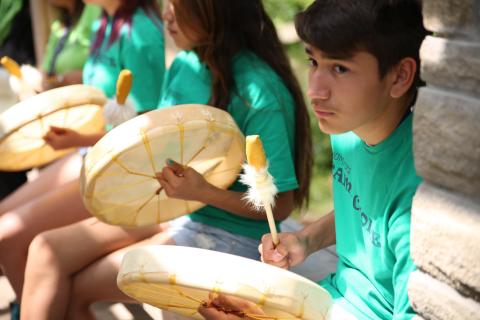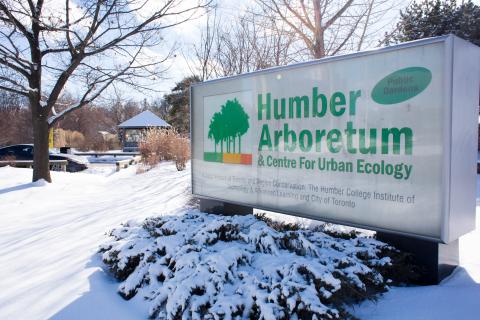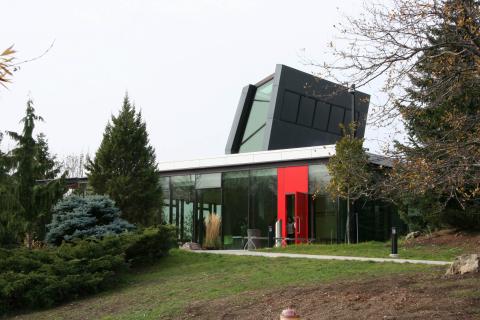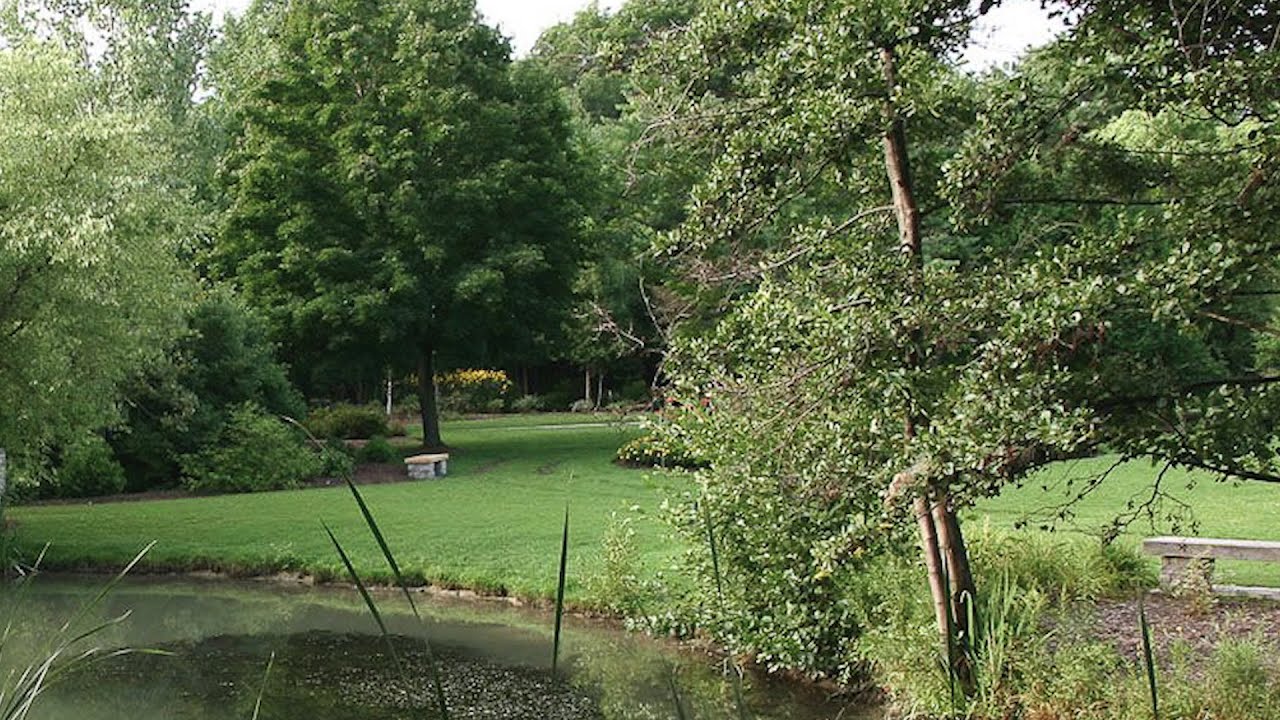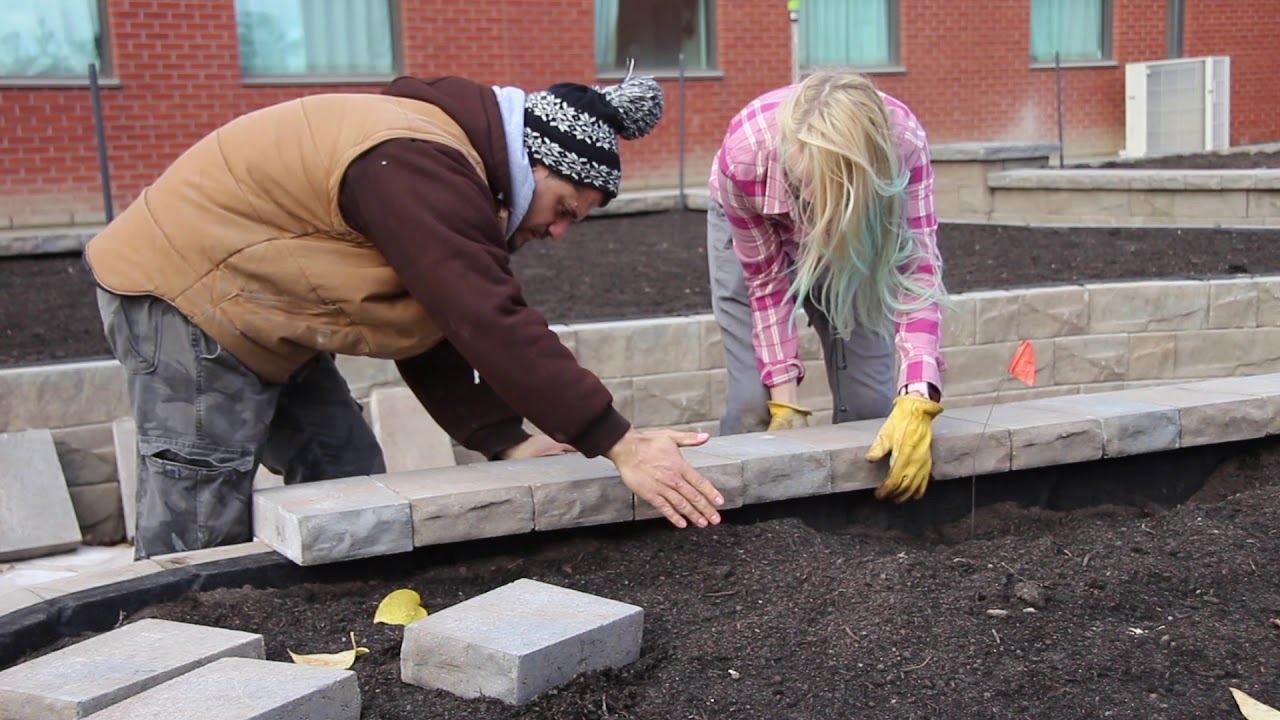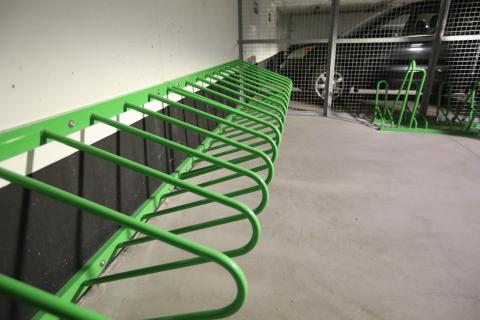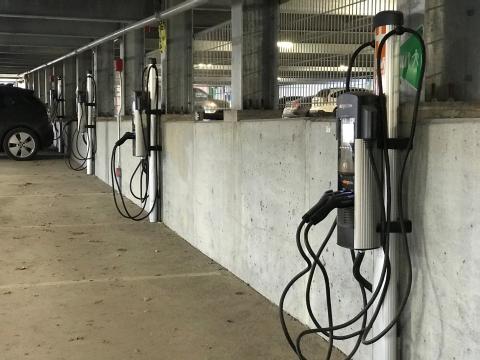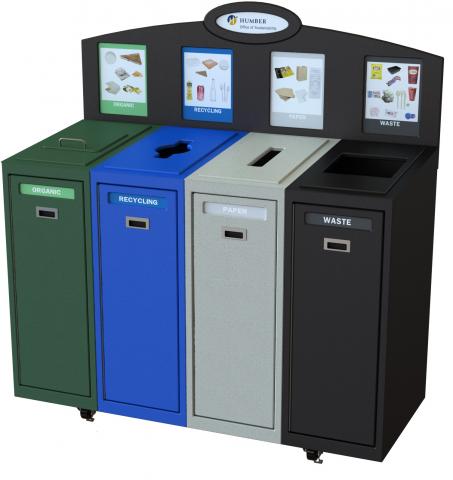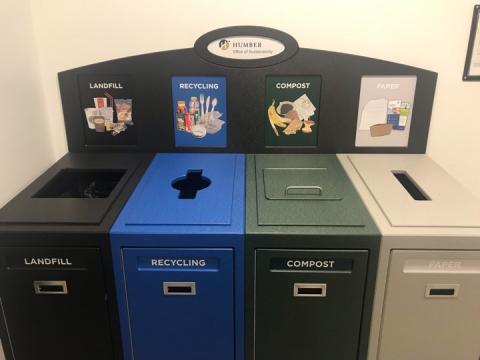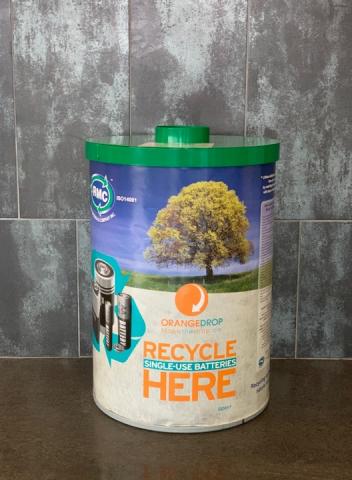All campus development and operations begin by incorporating sustainability into the design and building process and connecting students to real-world learning opportunities. In all areas of our operations, we will prioritize the health of our people and the nature around us through collaborative and data driven decision making.
Climate Action & Built Environment
We have made aggressive energy and climate commitments, which means we strive to build and operate low-impact campuses that support health and wellbeing, equity, diversity and inclusion, learning, innovation and community.
Our strategic priorities in Climate Action & Building Environment are:
- Net Zero in 2029 through significant reductions in campus greenhouse gas (GHG) emissions while preparing for and addressing the impacts of climate change.
- Pursue global best practice in sustainable design, construction and the operation of new and renovated buildings.
- Ensure our spaces prioritize health, accessibility, functionality and social inclusion.
- Our campuses will be places where students and the community come to learn from the latest in healthy and efficient building design and operations.
- Create spaces that situate the campus in the context of diverse histories, lands and waterscapes.
These strategic priorities are addressed through various plans and initiatives, specificially in the Integrated Energy Master Plan (IEMP) and Climate Action Plan.
Climate Action Plan
Climate Action Plan Update: Humber Polytechnic Accelerates Its Net-Zero emissions target from 2050 to 2029
Humber Polytechnic is accelerating its sustainability goals, moving its net-zero emissions target from 2050 to 2029. This commitment includes transitioning from natural gas to advanced electric heating systems, significantly reducing Humber’s carbon footprint. By achieving net-zero more than 20 years ahead of schedule, Humber aims to be one of the first Canadian institutions to reach this milestone, setting a new standard for climate action and sustainability leadership.
Dates and timelines in the Climate Action Plan PDF document remain the same from when the plan was originally developed in 2022, but targets will now be achieved much sooner as many projects will be fast-tracked.
The Climate Action Plan will address the college's Scope 1 and 2 emissions, which are greenhouse gas emissions that the college owns, has control over, or are from the generation of purchased energy. The innovative energy-efficient measures include:
- Retrofitting existing building envelopes and modifying controls
- Optimizing existing building energy performance
- Replacing natural gas heating equipment with decarbonized options when they reach the end of useful life
- Converting existing steam distribution systems to low-temperature hot water and electrifying heating sources
- Ensuring new builds meet rigorous, best in the country, energy-efficient and zero-carbon standards
The Climate Action Plan extends its reach to encompass Scope 3 emissions as well; these are GHGs associated with the College, yet not directly owned or controlled by us. These include aspects such as commuting, waste, food, and paper use. Humber is committed to proactively addressing Scope 3 emissions through the implementation of ongoing projects and innovative initiatives embedded in college-wide plans and goals, aimed at reducing overall emissions.
The plan enhances Humber's commitment to sustainability and aligns with Canada’s goals to address the climate crisis and build resilient, healthy communities.
Green Building Standards
Humber College introduced Green Building Standards that mandate sustainability requirements for the various types of construction projects at the institution. These standards contribute to the college's various strategic plans and initiatives, including the Integrated Energy Master Plan and Climate Action Plan.
The requirements include items such as mandatory zero carbon and LEED Platinum certification, stringent energy use targets, high performance building envelopes, resiliency, and much more.
The Green Building Standards establish clear deliverables that must be met by the design and construction teams. Sustainability requirements vary according to the size and complexity of projects. In order to standardize the requirements, projects are divided into four main project types summarized below:
- Type A – New Buildings, Additions & Major Renovations - Large (>2500m2, >$15M)
This project type applies to larger new buildings or major building renovations. Typically, these projects would impact over 2,500m2 of floor area or have a capital budget exceeding $15M. - Type B – New Buildings, Additions & Major Renovations - Small (<2500m2, <$15M)
This project type applies to smaller new buildings, additions or major building renovations. Typically, these projects would impact less than 2,500m2 of floor area or have a capital budget below $15M. - Type C – Interior Renovations & Fit-Outs - Large (>$3M)
This project type applies to larger interior renovations & fit-outs that have a capital budget exceeding $3M. - Type D – Interior Renovations & Fit-Outs – Small ($100k to $3M)
This project type applies to smaller interior renovations & fit-outs that have a capital budget below $3M.
The four Green Building Standards documents can be found for download in the Resources and Reports page.
Green Project Summaries
The Green Project Summaries are documents that outline sustainability features of new campus buildings and retrofit projects. They are available online for open access to information on our green building initiatives.
Browse through the completed Green Project Summaries to learn more about sustainable builds at Humber:
Integrated Energy Master Plan
As part and parcel of our sustainability initiatives, and in support of Canada’s commitment to a reduction in greenhouse gas emissions, Humber authorized the development of an Integrated Energy Master Plan (IEMP) in 2015. The IEMP has the following goals:
-
Reduce energy use by 50% per square foot by 2034
-
Reduce water use by 50% per student by 2034
-
Reduce greenhouse gas emissions by 30% by 2034
-
Become a national and global role model with world-class energy performance
-
Develop scalable solutions, so that if we can do it, others may follow
-
Offer world-class courses addressing competitive and integrated energy, water and climate solutions while acting as a living laboratory for our students
-
Create a campus-wide energy culture by engaging both staff and students via education/events
The IEMP is a strategy document developed in sufficient detail to establish overall priorities and investments but with flexibility to adapt to changing technologies. You can learn more about the plan and Humber's progress towards the goals on the IEMP page.
The plan requires an investment of $65 million to achieve the ambitious goals though innovative and comprehensive energy, water and greenhouse gas reduction solutions.
SWITCH
SWITCH is the infrastructure project decarbonizing the heating and cooling system at the North Campus. The project will reduce reliance on natural gas by switching from a steam-based system, constructed in 1972, to a modern hot water system generating heat mostly using electricity.
To learn more, access the SWITCH project page.
Water Systems
Water is a precious resource. Our campuses are situated along Gabekanang Ziibi (the Humber River watershed), providing a home and habitat to 600 bodies of water, 755 species of plants, 42 species of fish, and over 185 animal species. This territory is subject to the Dish With One Spoon Treaty which reflects that people do not own the land but belong to the land as a relative and protector of land for future generations.
Humber has committed to a 50% reduction in 2014 water use per student by the year 2034, as part of its Integrated Energy Master Plan (IEMP). Water conservation is an integral part of the college’s operations.
New buildings are designed with water efficiency in mind and water use is monitored in all facilities to track and manage peak demand. All new buildings have green roofs that provide an effective way to collect and slow rainwater.
We actively reduce the amount of water used in grounds maintenance by optimizing landscaping to reduce watering frequency for plants and lawns. We work continuously to educate our students and staff about water conservation, reminding them that simple daily acts, like bringing a reuseable water bottle everywhere you go, turning off taps and reporting malfunctioning plumbing, play an important role in protecting our shared resource.
The Humber community has eliminated well over 6 million single use plastic water bottles from landfills since 2014 through the use of our water refill stations.
In the Media
Our green projects draw attention due to innovative approaches to sustainability and energy efficiency. In the list below you can find some of the media coverage of Humber's groundbreaking Climate Action & Built Environment projects.
Articles
- Humber closes in on net-zero with major decarbonization endeavour - Sustainable Biz
- Humber College building achieves zero carbon design certification - ReNewCanada
- Humber College receives $1 million to upgrade heating system - Plumbing and HVAC
- For Humber College, sustainability is an innate value - The Globe and Mail
- Building NX retrofit - Sustainable Architecture and Building Magazine
- Humber College uses digital twins to make buildings smarter - The Globe and Mail
- Cutting greenhouse gas emissions by 30%: Humber launches project to bring the college closer to carbon neutrality - Toronto.com
- Embedding sustainability, catalizing change - The Globe and Mail
- Net zero by 2030? Companies are taking the pledge - The Globe and Mail
- Humber College's net-zero Barrett CTI a green leader, teacher - Sustainable Biz
- Humber College leverages networked lighting controls to support sustainability initiatives across the campus - Encelium
- Humber College's Building NX the first retrofit project to achieve ZCB-Design certification - CAGBC
- CEU: Energy Retrofits - Sustainable Architecture and Building Magazine
- Energy treasure hunt: An integrated approach to campus sustainability - The Globe and Mail
Videos
- Humber IEMP Progress by 2023
- SWITCH Phase One Wrap-Up
- Introducing SWITCH Energy Efficiency Retrofit
- Barrett Centre for Technology Innovation
Natural Environment
At Humber, we are stewards of the natural environment. We collaborate with campus partners to improve the health and resilience of the natural areas surrounding the College.
Stewardship of the Land
Stewardship of the natural environment and the regional biodiversity in which our campuses are located. We collaborate to protect and improve the health and resilience of these areas, which will improve the quality of campus and community life now and for future generations.
Campus Landscaping
Humber Facilities Management incorporates several practices to maintain campus grounds in sustainable ways. These include:
- Native plant species are favoured in landscaping
- Pesticide-free products are selected to prevent toxins from leaching into the soil
- Environmentally-friendly coated salt products are used to minimize corrosive salt damage
- The parking lots at Humber College North Campus were landscaped following the City of Toronto's Design Guidelines for 'Greening' Surface Parking Lots. Among the 200 trees and 1000 shrubs installed, three-quarters were selected from the guide's Native Species Planting List.
Humber's 250-acre Arboretum has specific areas that have been designated as native plant materials only. This does not call for the removal of all exotic species, only of invasive ones.
- Plants are sourced from nurseries that can identify their seed source and fall within the seed zones closest to our location –37, 34, 33, 32.
- Areas surrounding the ponds are planted with native herbaceous and woody species specific to the habitat.
- Other areas of the site –select native species for use if suitable.
In Humber's 2019-2024 Sustainability Plan, we have committed to developing a Sustainable Landscaping Management Program and a biodiversity management strategy.
Campus Beehives
Honey bees pollinate approximately 70% of the world's crops; without them, our grocery stores will be empty. Sadly, the gentle honey bee is quickly becoming extinct due to a phenomenon known as Colony Collapse Disorder (CCD), which is mainly caused by the heavy use of insecticides (also known as Neonicotinoids). Urban beekeeping has become a great alternative and helps the honey bees thrive.
In an effort to rebuild the number of worker honey bees in our local area, we installed hives at North and Lakeshore campuses to provide a safe environment for honey bees to thrive. Visit the hives near the staff lounge at North Campus (second floor of K building) or Lakeshore Campus on the second floor of the L building.
Lakeshore Campus and Colonel Samuel Smith Park
Humber's Lakeshore campus is located within the traditional territory of the Ojibwe Anishinaabe, situated just west of Toronto and on the shoreline of Lake Ontario. The campus offers beautiful historic buildings and many ways to connect with nature, including Colonel Samuel Smith Park, which is one of Toronto's most diverse urban green spaces.
Next time you're at the Lakeshore campus, visit The Lakeshore Grounds Interpretive Centre to learn more about the natural and built environment and engage in cultural programming and exhibitions!
Great Canadian Shoreline Cleanup
Humber's North and Lakeshore locations have participated in several campus cleanups. Each cleanup is registered with the Great Canadian Shoreline Cleanup, a national conservation program that collects citizen science data about the litter collected and encourages Canadians to participate in their communities.
Connecting People with Nature
Camp Choice
Humber’s Camp Choice is an initiative to help Indigenous youth build a successful future. Participants learn current Indigenous teachings, such as land-based ways of living, in a variety of engaging, hands-on workshops.
Programs and Courses
Humber offers a variety of programs and courses that focus on outdoor, experiential learning. Please visit the Teaching and Learning page for a full list.
Highlight: Forest Nature Program
Launched in 2016, the Forest Nature Program was created through health and wellness and Indigenous mandates. The program helps children explore nature and learn from and with the land. Humber students studying in the Early Childhood Education program also benefit from learning about the forest nature programs, as it is part of their placement opportunities. They help encourage play and outdoor learning with the children while creating new methods to enhance physical activity and wellness. In September 2019, the program received the Edward Burtynsky Award for excellence in environmental inquiry.
Humber Aboretum and the Centre for Urban Ecology
Humber Arboretum
The Humber Arboretum is 250 acres of forests, meadows, wetlands, ponds and the Humber River. This public garden, conservation area, and educational center is a joint partnership between the City of Toronto, Humber College and Toronto Region Conservation Authority (TRCA). This unique tripartite agreement between the three entities protects and restores habitats for native plants and animals and provides various educational opportunities for students and the general public, including nature camps, weekly nature walks, elementary school programs applied research opportunities and much more. The Humber Arboretum is free to visit.
To learn more, please visit the Humber Arboretum’s website.
Centre for Urban Ecology
Located inside the Humber Arboretum is the Centre for Urban Ecology. The building is rated Gold by the Leadership in Energy and Environmental Design (LEED) and is home to the Arboretum’s educational programs and special events.
Humber Pond Revitalization Project
The Humber Pond plays a key role in managing runoff water from Humber College's north campus before it reaches the Humber River. The Humber Pond Revitalization Project is an innovative, collaborative initiative to improve water quality in the pond while increasing natural habitat for wildlife, providing new social gathering spaces for our community, and creating an outdoor classroom and living laboratory space for students.
Humber Food Learning Garden
Where does your food come from? Why does it matter? The new Humber Food Learning Garden is a space for students and community members to learn about sustainable urban agriculture, local food security, and growing and harvesting their own fresh, healthy food in whatever space is available to them.
Learning by Leading(TM) Program
Developed by the University of California at Davis Arboretum and Public Garden, the Humber Arboretum's Learning by Leading™ Program is based on the idea that students learn best by taking leadership in helping to solve real-world problems. The Humber Arboretum was selected as the only public garden in Canada to be part of a pilot project to create a network of Learning by Leading™ programs at public gardens across North America.
Food Systems
By incorporating sustainability into our standard operating practices and requiring our suppliers to adhere to specific sustainability requirements, we are creating a healthier and more environmentally responsible working and learning environment at Humber.
Healthy and Local Campus Eateries
We want to have broad access to Good Food (“food that fundamentally respects human dignity and health, animal welfare, social justice and environmental sustainability”) on our campuses that celebrates our cultural diversity, health and well-being. Some of the places on campus that support this value are highlighted below.
The Humber Room and Gourmet Express
Grab a delicious vegetarian to-go meal at Gourmet Express or enjoy a dine-in experience at our on-campus restaurant, the Humber Room. Located at North campus, both options offer healthy dishes prepared by culinary students and Fairtrade products. Check out all of the student-made campus food at Hungry Humber.
Soup Bar
In collaboration with Ignite, Humber College and Feed it Forward, Soup Bar is available to everyone and operates as a grab and go initiative. Creations range from a classic Chicken Noodle to Thai Coconut Curry and use food donated by local restaurants, businesses, and the Humber Arboretum’s Food Learning Garden. You can find frozen 1L soups in Soup Bar freezers at the IGNITE Student Centre (KX202) at the North Campus and L Commons 2nd floor at the Lakeshore Campus.
The Spot
Located in the Barrett Centre for Technology Innovation at North campus, The Spot offers a daily menu featuring a vegetarian, vegan and meat option based on seasonal and local ingredients. You can also choose the dine-in experience to reduce single-use waste!
Sustainable Purchasing
Our goal is to educate the Humber community to be able to apply social and sustainable purchasing practices in order to promote a circular economy. To formalize our commitment, sustainability standards are now factored into our purchasing RFP matrix.
Social and Sustainable Purchasing
What is Social Procurement? Social procurement represents the clear choice by an organization to support social goals through their purchasing of goods and services. This can be done by embedding the delivery of social and sustainable outcomes within tenders and processes.
What is Sustainable Procurement? Sustainable procurement means making sure that the products and services we buy are as sustainable as possible, with the lowest environmental impact and most positive social results.
Our current goals in this area are:
- Create a guiding document for social and sustainable purchasing practices.
- Develop and run workshops to support understanding and use of the campus social and sustainable purchasing guiding document.
- Update main RFP template and Procurement Policy with social and sustainable purchasing language, requirements and evaluation matrices. Develop a tracking mechanism for RFPs integrating sustainability into evaluation matrices.
We have begun the work to develop a guiding document(s) and update the Procurement Policy. Stay tuned for updates. Contact us for more information!
Fair Trade Campus
We are proud to hold the designation of Fair Trade Campus at our North and Lakeshore locations. The Fair Trade Campus Steering Committee ensures that Fairtrade certified products are available on campus and raises awareness about making conscious consumption choices. Visit our Fair Trade Campus page to learn more and find out where you can purchase Fairtrade products on campus.
Where can I buy Fairtrade products on campus?
North campus:
- Catering menu, Birch Bark Coffee
- Gourmet Express, Mountain View Estates Fair Trade Coffee
- GH Café, Fair Trade Espresso only, Starbucks Brand
- Humber Room, Mountain View Estates Fair Trade Coffee
- Humber Bookstore, Camino Fair Trade Chocolate bars
- Street Café, Birch Bark Coffee & Camino Fair Trade Chocolate bars
- Residence Dining, Camino Fair Trade Chocolate bars
- Starbucks, Espresso only
Lakeshore Campus:
- Catering, Birch Bark Coffee
- Lakeshore Bookstore, Camino Fair Trade Chocolate bars
- L Commons Eatery, Canteen Fair Trade Coffee
- Media Buzz, Canteen Fair Trade Coffee
- Starbucks, Espresso only
Look for the Fairtrade symbol when shopping and check out our Sustainable Features map for directions!
Paper
As an academic institution, we use a lot of paper. In our Sustainability Plan we have commitments that will result in campus-wide actions to reduce our paper use. Some of these commitments include evaluate and right-size printers across all areas, fleet review and balancing; track printing data and share with community; and, increase use and familiarity of electronic signatures.
Everyone can take simple steps to reduce their personal paper use. Here are some approaches to try:
- Switch to digital media when possible. For faculty, introduce digital textbooks and assignments on Blackboard when possible. For staff, store invoices and records digitally and use an e-signature when possible. Students should ask professors if a digital assignment option is available when not specified.
- Choose double-sided and black/white printing.
Read our guide for faculty on how to go paperless in the classroom!
Sustainable Transportation
With nearly 80,000 full and part-time students travelling to and from campus on a regular basis, transportation management is a major focus at Humber. We actively support energy-efficient forms of transportation, such as public transit, bicycle commuting and carpooling. By managing transportation demand; reducing traffic congestion; and enhancing campus security, we are steadily improving our environmental outcomes and making our campus cleaner and safer for the Humber community.
Bike Parking and Cycling
Secure Bike Rooms
There are secure, indoor bike parking facilities at both Lakeshore and North campus that you can register for! The cost for the year is $12 - pay online through MyHumber and contatct parking.sales@humber.ca if you have any questions.
- Lakeshore Campus: The secure bike room is located in the parking garage of the Welcome Centre and students, staff, and faculty are welcome to use it. For residence students wanting to use the secure bike room in Lakeshore residence, you can speak with the front desk or contatct lakeresmail@humber.ca.
- North Campus: Students and staff can park their bikes and scooters in Humber's Secure Bike Parking, located in the Commuter Hub (parking garage).
Learn more about How to Register and Pay for Secure Bike Parking as a Humber student. Guelph-Humber students should email parklock@uoguelph.ca to set up Secure Bike Parking.
Bike Parking on Campus
Check out these maps that show you where there is bike parking on campus:
Cycling Maps
Here are a few resources for planning your route to work, school, shopping, or simply to explore:
Bike Repair Stations
There is a self-service bike repair station at each of the Lakeshore and North campuses for everyone to use. They are located:
- North Campus: Next to the Parking Services Kiosk (directly in front of LRC)
- Lakeshore Campus: In front of the L Building on the east side of campus
Bike Share Toronto
A Bike Share station is available at the Lakeshore campus and multiple stations can be found near the IGS campus. Humber staff and students can receive a 20% discount on yearly memberships when they sign up with their Humber email. Visit Home | Bike Share Toronto to sign up.
Commuting by Transit
We are excited for the Finch West LRT (expected completion is in 2023). This new LRT route will provide transit from Humber College to Finch West Station and essential links to TTC Line 1, York and Peel Region local transit.
Transit Routes
Each campus connects to multiple transit routes including the Toronto Transit Commission (TTC), Brampton Transit and Mississauga Transit (MiWay).
View transit routes and campus maps to plan your routes.
TTC Full-Time Student Photo ID
Purchase the TTC Full-Time Student Photo ID at any time during the year at Bathurst Station. You can also get a photo ID on campus during the fall semester; follow @SustainHumber to find out when the next TTC campus visit is.
TTC Monthly Pass
There are a number of different TTC passes you can purchase on PRESTO:
- TTC Monthly Pass: This pass costs $156 for adults and $128.15 for seniors/youth. It provides unlimited travel on the TTC per month.
- 12 Month Pass: This pass costs $143 for adults and $117.45 for seniors/youth. It requires a 12-month commitment and provides unlimited travel on the TTC each month.
Electric Vehicle Charging Stations
Electric Vehicle Charging Stations
Humber has several electric vehicle (EV) dual charging stations across both campuses. The first four hours of charging are free and parking fees apply as usual.
North Campus
- Commuter Hub (Parking Garage): 16 EV charging stations
- Lot 9: Four EV charging stations (Please note: You must have a valid Humber parking permit to access Lot 9)
- Carrier Drive: Four EV charging stations
Lakeshore Campus
- Welcome Centre: Four EV charging stations in the underground parking area. (Please note: Hours of operation are Monday to Friday, 7 am to 10 pm and Saturday to Sunday, 8 am to 6 pm).
- Lot 1: Ten EV charging stations. Lot 1 is located behind B Building.
How can I use the EVs?
- Download the ChargePoint app and enter your credit card information. You will not be charged for the first four hours of complimentary charging.
- After four hours, Humber encourages you to move your electric vehicle to a regular parking spot. If you choose to remain parked at the EV charging station, you will be billed $5.00 for each hour or partial hour of additional charging.
Please note: You do not need to reserve these spaces in advance.
Smart Commute and Carpool
Smart Commute
Humber College has partnered with Smart Commute, a program geared towards promoting and encouraging sustainable transportation to help Humber reduce traffic and parking congestion, improve air quality, reduce GHG emissions, and allow our community to have a more enjoyable commute.
Carpool Matching Program
Smart Commute offers a free app to help you explore your options for sustainable travel across the GTHA. Sign up for the app (iOS, Android) to:
- Find a carpool match within the Humber community
- Plan and track your carpool, transit, walking and cycling trips
- Join a network of GTHA commuters through your workplace or organization
- Take advantage of program benefits including workplace travel support
How to use the app:
Carpool Parking Program
Humber Parking services offers carpool members the option to split a parking permit which saves everyone money on parking (on top of already saving money on gas). To sign up for the program, read the corresponding policies and email parking.sales@humber.ca to be assisted:
Waste Systems
Humber is continuously working to reduce, reuse and recycle. With the volume of waste generated by the campus population and Humber’s daily operations makes waste management an on-going priority. Fortunately, the waste produced in a college environment is well suited to management and recovery, as most of it is clean (non-hazardous) and can be easily separated for recycling.
Humber is constantly expanding its waste management program and has introduced holistic solutions to reduce waste production and encourage reuse, recycling and composting on campus.
How to Sort Your Waste on Campus
Humber College and the University of Guelph-Humber use centralized four-stream sorting stations to segment waste on campus (recycling, garbage, organics, and paper).
When waste, like recycling, compost, paper, and garbage, are segmented properly they have a better chance of getting to where they are intended to go. This means for example that organics can go on to be composted, recycling can be processed at a recycling plant, and garbage can go to a landfill.
When waste is not properly separated, the streams become ‘contaminated’. For instance, garbage that is put in the recycling soils the recyclable material, making it unsuitable for recycling. Contaminated recycling instead goes to landfill.
Please follow the easy-to-read signage to help make sure recycling, organics, paper, and garbage end up in the right spot. If you are in doubt, throw it in the waste bin!
To find out more about where to place your waste on campus check out the acceptable waste criteria list.
How do I reduce and recycle on campus?
Choose to reuse
Reduce the amount of waste you create by choosing reusable options. Bring a reusable bottle and use our free water refill stations, bring a zero-waste lunch and use a microwave station, and email sustainability@humber.ca if you're interested in grabbing a reusable cutlery kit. There are so many ways we can lead a zero-waste lifestyle. What will you be reducing this year?
#ReuseHumber Reusable Container Programs
Both North and Lakeshore campus have their own unique #ReuseHumber reusable container program which students, staff and faculty are invited to participate in at the campus they are on.
What goes in our recycling bins?
Approximately one-third of what we put in the recycling bin doesn't belong there. Please ensure you are reading the signage above each bin to clarify what belongs where.
Why do coffee cups go in the garbage?
Coffee cups have a wax lining, making the cup waterproof but challenging to recycle. The coffee cup belongs in the garbage bin while the coffee cup lid goes in the recycling bin, and the paper sleeve goes in the paper bin.
Low Waste Event Spaces
Humber College launched its first Low Waste Event Spaces for catering in three campus locations in September 2022 and has since expanded to more locations. Currently, only events catered through Chartwells are subject to the conditions of the Low Waste Event Spaces. When ordering, china service will be the default at no additional cost. All event attendees are highly encouraged to bring reusable containers to take away leftover food.
Student events are not yet part of this initiative, though eventually all spaces and categories of events will be transitioned to low waste as we work with the Humber community to find solutions that to meet needs while decreasing our impact on the environment.
The Low Waste Event Space designation aims to reduce waste output across campus and align with the federal government’s Single-Use Plastics Prohibition Regulation, keeping unnecessary plastics from going to landfill.
The following is a full list of Designated Low-Waste Event Spaces:
North Campus:
- Doris Tallon Community Room (NX 111)
- E-Concourse
- B101 Boardroom
- T Residence Conference Room (T132)
- Residence Dining Hall
- Barret CTI
- LRC Concourse
Lakeshore Campus:
- A Blue Room (A170)
- L Community Room (L 1017)
- AB café Dining Hall
- L Building Café 2nd Floor
- G Commons
- Student Welcome and Resource Centre
PPE, Battery, and Pen Recycling
PPE Recycling
During the course of the pandemic, masks, gloves and other single-use items were essential in staying safe. With the mask mandate lifted, we observed a decline in the PPE collection on campus, so PPE recycling is now limited to serving academic programs that require PPE use.
PPE items can still be recycled on campus in locations near Nursing and Culinary classrooms.
Battery Recycling
Batteries contain toxic chemicals, so it’s very important that you recycle them properly! Bring your batteries to the following battery-recycling bin locations:
- North Campus: Outside of IGNITE office at KX202
- University of Guelph-Humber: 2nd floor by room GH214.
- Lakeshore Campus: 2nd floor of L building cafeteria next to elevator doors, 1st floor of Welcome Centre in front of Registrar's Office, & 1st floor BIRM by Tim Hortons.
- International Graduate School: 4th floor by room 410.
Pen Recycling
Humber disposes of over 40,000 pens a year, so we recycle all kinds of writing instruments, including:
- Pens and pen caps
- Mechanical pencils
- Markers and marker caps, including dry-erase and permanent
- All brands and any colour
- ...basically, if you write with it, it can be collected for recycling!
Bring your used writing instruments to a drop-off location on campus, and we’ll make sure they’re appropriately recycled:
- North: Just outside of Ignite, KX202
- Lakeshore: Next to the elevator, L-building (2nd floor) and 1st floor of H building by the main entrance.
- International Graduate School: 4th floor, by room 410.
For Humber staff and faculty, we created DIY Collection Box for your offices! There is a limited supply, so please contact sustainability@humber.ca for more information.
Textbooks for Change
You can donate your used textbooks and positively influence global education AND environmental sustainability! So far, Humber’s Textbooks for Change program has diverted over 4000 pounds of used book materials from landfill.
If your textbook is less than 15 years old, drop it off at one of our on-campus locations:
North campus:
- KX Building: outside Humber Student Federation – HSF
- K107: outside the School of Media Studies and Information Technology office
- E205: outside The Business School office
- LRC: Math Centre – 3rd floor
Lakeshore campus:
- A Building: near The Music Office and Liberal Arts and Sciences
- H Building: Main Floor - across from the International Office
- H Building: 2nd Floor near the Business School
- L Building: 3rd Floor
- Annex/Humber Centre for Justice Leadership – Main Floor near Security







